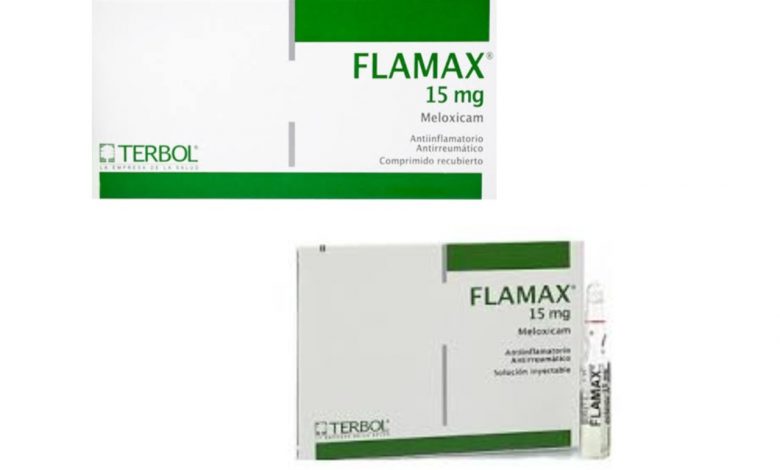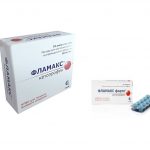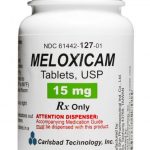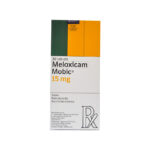Flamax 15mg: Uses, How It Works, Dosage, Side Effects, Interactions

What is Flamax 15mg?
Flamax 15mg is a brand of meloxicam used to relieve pain, tenderness, swelling, and stiffness caused by osteoarthritis (arthritis caused by a breakdown of the lining of the joints) and rheumatoid arthritis (arthritis caused by swelling of the lining of the joints).
Flamax 15mg is a powerful pain reliever that can only be obtained legally with a prescription. Although nonsteroidal anti-inflammatory drugs (NSAIDs) are available without a prescription or over-the-counter, Flamax 15mg is more potent than other over-the-counter NSAIDs used to treat pain.
Flamax 15mg comes as a tablet and injection both containing 15 mg of meloxicam as the active ingredients.
How it works
Flamax 15mg belongs to a class of drugs called nonsteroidal anti-inflammatory drugs (NSAIDs). NSAIDs help reduce pain, inflammation, and fever.
It isn’t known how this medication works to decrease pain. It may help reduce swelling by lowering levels of prostaglandin, a hormone-like substance that usually causes inflammation.
How should this medicine be used?
The meloxicam dosage your doctor prescribes will depend on several factors. These include:
- the type and severity of the condition you’re using meloxicam to treat
- your age
- the form of meloxicam you take
- other medical conditions you may have, such as kidney damage
Typically, your doctor will start you on a low dosage and adjust it over time to reach the dosage that’s right for you. They’ll ultimately prescribe the smallest dosage that provides the desired effect.
Typical dosing for Flamax 15mg tablets is as follows:
Rheumatoid arthritis and osteoarthritis: Take 1 tablet (15 mg) by mouth once a day. Do not take more than 15 mg a day.
Flamax 15mg injection comes as a solution (liquid) to inject intravenously (into a vein). It is usually given once a day as needed for pain by a healthcare provider in a hospital.
Ask your pharmacist or doctor for a copy of the manufacturer’s information for the patient.
What are the side effects of Flamax 15mg?
Meloxicam injection may cause side effects. Tell your doctor if any of these symptoms are severe or do not go away:
• constipation
• diarrhea
• pain or itching at the injection site
Some side effects can be serious. If you experience any of the following symptoms, call your doctor immediately or get emergency medical treatment:
• fever
• blisters
• rash
• skin blisters or peeling
• hives
• itching
• swelling of the eyes, face, tongue, lips, or throat
• difficulty breathing or swallowing
• pale skin
• fast heartbeat
• shortness of breath or difficulty breathing
• unexplained weight gain,
• swelling in the abdomen, ankles, feet, or legs
• nausea
• excessive tiredness
• lack of energy
• yellowing of the skin or eyes
• pain in the right upper part of the stomach
• flu-like symptoms
• cloudy, discolored, or bloody urine
• back pain
• difficult or painful urination
Flamax 15mg may cause other side effects. Call your doctor if you have any unusual problems while taking this medication.
If you experience a serious side effect, you or your doctor may send a report to the Food and Drug Administration’s (FDA) MedWatch Adverse Event Reporting program online (http://www.fda.gov/Safety/MedWatch) or by phone (1-800-332-1088).
Precautions
Before using Flamax 15mg, tell your doctor or pharmacist if you are allergic to it; or to aspirin or other NSAIDs (such as ibuprofen, naproxen, celecoxib); or if you have any other allergies. This product may contain inactive ingredients, which can cause allergic reactions or other problems. Talk to your pharmacist for more details.
Before using this medication, tell your doctor or pharmacist your medical history, especially of:
- asthma (including a history of worsening breathing after taking aspirin or other NSAIDs)
- blood disorders (such as anemia)
- bleeding or clotting problems
- growths in the nose (nasal polyps)
- heart disease (such as a previous heart attack)
- high blood pressure
- liver disease
- stroke
- stomach or intestinal or esophagus problems (such as bleeding, heartburn, ulcers)
Kidney problems can sometimes occur with the use of NSAID medications, including meloxicam. Problems are more likely to occur if you are dehydrated, have heart failure or kidney disease, are an older adult, or if you take certain medications (see also Drug Interactions section). Drink plenty of fluids as directed by your doctor to prevent dehydration and tell your doctor right away if you have any unusual change in the amount of urine.
Flamax 15mg can make you dizzy. Alcohol or marijuana (cannabis) can make you dizzier. Do not drive, use machinery, or do anything that needs alertness until you can do it safely. Talk to your doctor if you are using marijuana (cannabis).
This medicine may cause stomach bleeding. Daily use of alcohol and tobacco may increase your risk for stomach bleeding, especially when combined with this medicine. Limit alcohol and stop smoking. Consult your doctor or pharmacist for more information.
Before having surgery, tell your doctor or dentist about all the products you use (including prescription drugs, nonprescription drugs, and herbal products).
This medication may make you more sensitive to the sun. Limit your time in the sun. Avoid tanning booths and sunlamps. Use sunscreen and wear protective clothing when outdoors. Tell your doctor right away if you get sunburned or have skin blisters, or redness.
Older adults may be at greater risk for stomach or intestinal bleeding, kidney problems, heart attack, and stroke while using this drug.
Before using this medication, women of childbearing age should talk with their doctor(s) about the benefits and risks. Tell your doctor if you are pregnant or if you plan to become pregnant. This medication may harm an unborn baby and cause problems with normal labor or delivery. It is not recommended for use in pregnancy from 20 weeks until delivery. If your doctor decides that you need to use this medication between 20 and 30 weeks of pregnancy, you should use the lowest effective dose for the shortest possible time. You should not use this medication after 30 weeks of pregnancy.
It is unknown if this medication passes into breast milk. Consult your doctor before breastfeeding.
What Other Medications Interact With Flamax 15mg?
Several drugs can interact with Flamax 15mg when used together, including:
• Angiotensin-converting enzyme inhibitors and diuretics: Flamax may reduce the effectiveness of these medications.
• Aspirin: When taken together, aspirin can increase blood levels of meloxicam and increase the risk of GI ulceration. Flamax is not a substitute for low-dose aspirin for cardiovascular prevention.
• Cyclosporine: When taken with cyclosporine, Flamax 15mg and other NSAIDs can increase kidney toxicity.
• Lithium: Flamax 15mg increases the blood concentration of lithium when taking both medications. Lithium takers should monitor for signs of lithium toxicity when Flamax is started, adjusted, or stopped.
• Methotrexate: Flamax 15mg can decrease the clearance of methotrexate from the body, increasing the risk of toxicity. Closely monitor for signs of methotrexate toxicity when this combination is used.
• Prednisone: The combination increases the risk of GI ulceration.
• Warfarin: The combination increases the risk of serious GI bleeding.
It is also not recommended to use Kayexalate (sodium polystyrene sulfonate) with Flamax, as it may potentially cause intestinal necrosis, a serious and sometimes fatal condition caused by reduced blood flow to the GI tract.





